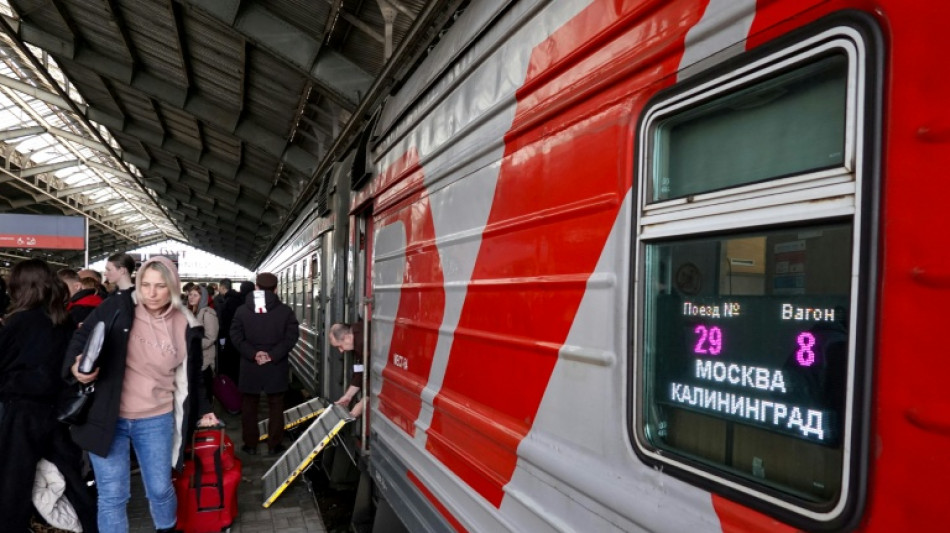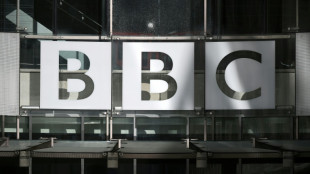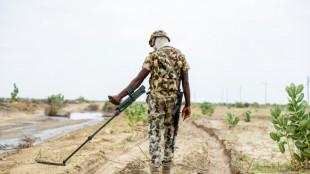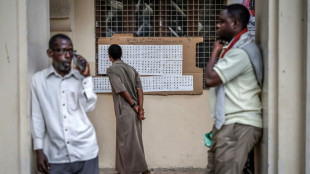
On board the Cold War-style sealed train from Moscow to Kaliningrad

As the Moscow-Kaliningrad train approached Lithuania, the car attendant beckoned to passengers in Russian: "I'm closing the entire carriage, the toilets are out of action."
The 19-hour, 1,000-kilometre (650-mile) journey is the only land route between mainland Russia and its coastal exclave of Kaliningrad, wedged on the Baltic Sea between EU and NATO members Poland and Lithuania.
In echoes of the Cold War, passengers on the "Yantar", the Russian word for amber, are locked inside for the three hours it spends traversing Lithuania.
The Baltic state has been one of Europe's most pro-Kyiv voices, pushing for a hard line against Russia since it ordered troops into Ukraine in February 2022. Moscow sees it as a hostile state.
Doors and windows are sealed -- to prevent Russians jumping off and escaping, Vilnius says. The toilets are only open for use while the train is speeding along, not when it stops.
"The border with Lithuania is in 30 minutes," the assistant shouted to rouse slumbering passengers.
Though the train is half-empty, sleeping quarters are cramped and heating is blasted to the max.
Russian citizens need a visa for the EU's Schengen zone or a special transit permit for the journey, even if they cannot set foot outside the train.
"Sometimes there are even fewer passengers. Travelling has become complicated since 2022," one attendant, speaking anonymously, told AFP on a recent journey.
"Neither EU citizens nor Russian citizens are allowed to leave the transit train," except in "urgent humanitarian reasons," like if a passenger falls seriously ill, Lithuania's State Border Guard Service told AFP in written comments.
For that reason, "the doors and windows are sealed," an agent of the EU's Frontex border force told AFP at a checkpoint en route.
"In the past, Russians found ways to get off the train and vanish into the wild," the agent, speaking on condition of anonymity as he was not authorised to speak to media, told AFP as he went between compartments checking documents.
- 'Hot war' -
On board, Nikolai was keeping an eye on a package slid under his bunk.
"It's for my mum, she lives in Kaliningrad," he told AFP.
He opted for the train to save money -- 4,000 rubles ($50), compared to 10,000 ($125) for a flight -- despite the hassle.
"It's a little similar to the Cold War. But now it's more of a hot war with the West," he said.
From the Russian perspective, Kaliningrad, home to around one million people, has become something of a front line in its standoff with the West.
It is the headquarters of the Russian Baltic fleet and hosts Iskander nuclear-capable ballistic missiles.
To fly between the exclave and the Russian capital, planes are forced on an hours-long detour northwards, through the Gulf of Finland, due to a ban on Russian commercial planes using EU airspace.
Lithuania earlier this month issued a diplomatic protest at Moscow over an alleged brief incursion into its airspace by two military planes stationed in Kaliningrad. Moscow has also bristled at what it calls threats by Vilnius to cut off land transit routes.
And Baltic neighbour Estonia said in September that Russian jets had violated its airspace for 12 minutes, prompting US President Donald Trump to say NATO should shoot down Russian planes that encroach members' airspace.
- 'Do you agree?' -
Undergoing border checks at the Kena station, Lithuania also makes sure the Russians onboard have no doubt about its allegiances.
"Putin is killing Ukrainian civilians. Do you agree with it?" a poster facing into the train reads in Russian.
Photos of destroyed Ukrainian cities plaster the platform fence.
Two years ago, Lithuanian media were reporting several cases of Russians using the stop as their "window to Europe".
The toilets are reopened as the train leaves Kena, only to be locked again a few hours later at the Kybartai border checkpoint, the exit point from Lithuania.
Russian border guards embark, subjecting non-Russian passengers to a barrage of questions.
"It's their job to be curious," said Vladimir, a retiree travelling with his wife, Irina. "Especially with foreigners."
As the Yantar pulled into its final stop in Kaliningrad, and the doors unsealed for the final time, he puffed up: "We fear nothing. We are brave."
K.Grimaud--PS

 London
London

 Manchester
Manchester
 Glasgow
Glasgow
 Dublin
Dublin
 Belfast
Belfast
 Washington
Washington
 Denver
Denver
 Atlanta
Atlanta
 Dallas
Dallas
 Houston Texas
Houston Texas
 New Orleans
New Orleans
 El Paso
El Paso
 Phoenix
Phoenix
 Los Angeles
Los Angeles



